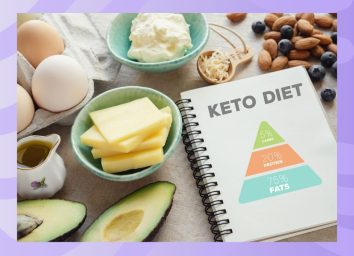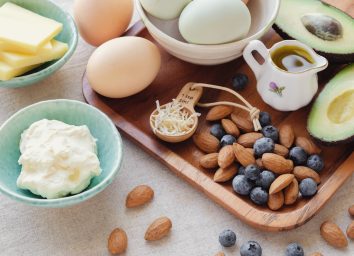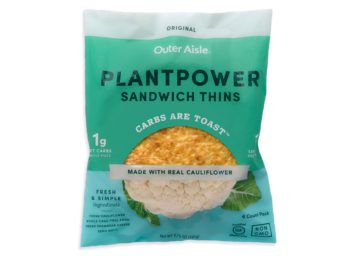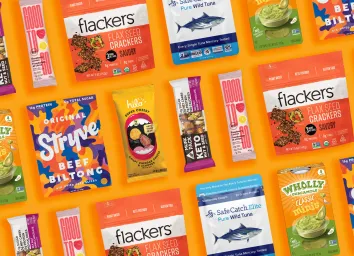Here's Exactly How to Eat a Vegetarian Keto Diet
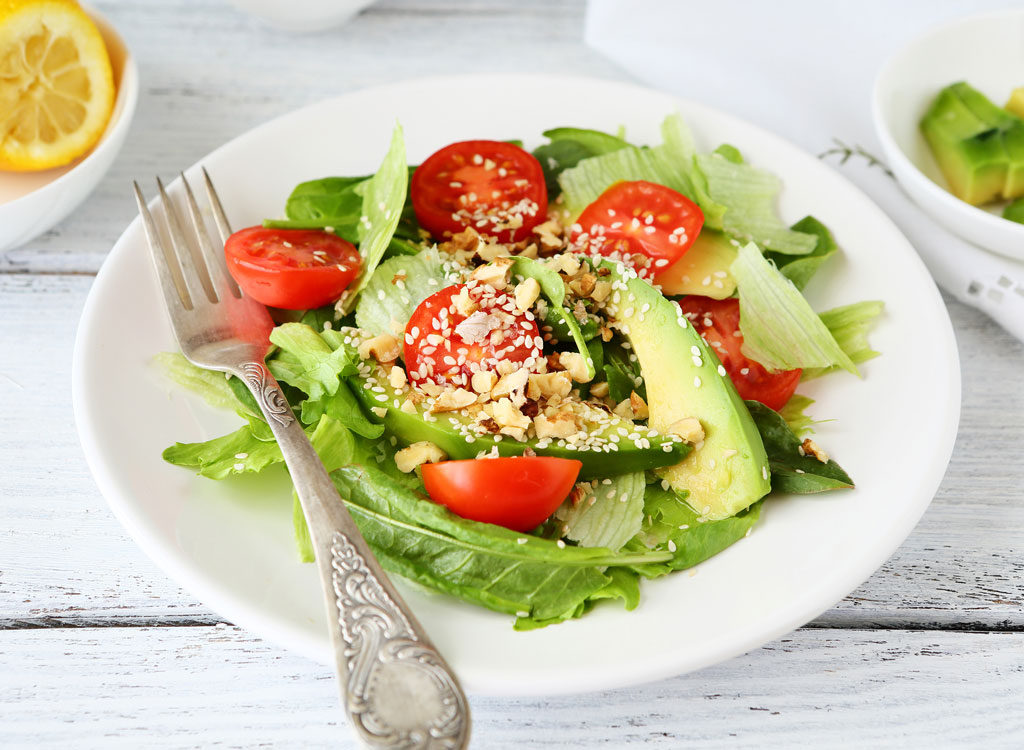
Here's a common misconception for you: You have to eat meat to follow the keto diet. While it's true that because a traditional keto diet is a low-carb, high-fat, and moderate-protein diet in which animal products like meat, poultry, fish, and dairy are regularly consumed, you can eat a vegetarian keto diet and still reap the same results.
"The ketogenic diet sets up the body to burn fat as its primary source of energy rather than carbohydrates—this is ketosis," says Maddi Lupul, MS, RD at eMeals.
The key to achieving and maintaining this fat-burning state is to follow a macronutrient breakdown of 70-75 percent of your calories coming from fat, 20 percent from protein, and 5 percent or less from carbs, says Lupul. In other words, there are no specific guidelines as to what types of foods you have to eat to meet these nutrients, other than whole, unprocessed foods. Meat and other dairy products certainly make hitting these goals a little easier, but it's not a requirement of the diet.
In fact, for Dr. Will Cole, a leading functional-medicine expert, IFMCP, DC, and author of the upcoming book The Inflammation Spectrum and the developer of Ketotarian, a plant-based keto diet plan, a proper vegetarian keto diet will not only yield all the benefits of a traditional keto diet, but also eliminate all of the inflammatory foods people often struggle with (i.e. dairy, processed meats, and artificial sweeteners).
"I am a big fan of the ketogenic diet, but find that going plant-centric takes advantage of the health benefits of both conventional keto diets and plant-based diets," says Dr. Cole. Plus, as long as you are actively planning your meals, satiety is also a non-issue. "A typical day for me might include a chia pudding breakfast bowl, frittata pizza for lunch, and grilled cauliflower steaks for dinner. These meals are rich in healthy fats and nutrients, which keep me full for longer."
How does a vegetarian keto diet compare to a traditional keto diet?
A traditional ketogenic diet focuses on restricting carbohydrates, and increasing your intake of protein sources like eggs, meat, poultry, and fish, plus, unprocessed fats, such as olive oil, avocado, nuts, seeds, and more, says Lupul. A vegetarian keto diet, on the other hand, is a little more tricky—but not impossible—to navigate because it eliminates a bunch of the staple foods vegetarians would normally eat, she says. In order to go keto as a vegetarian, you have to be willing to carefully plan and be mindful of your food choices to make sure you're getting enough of the essential vitamins and nutrients your body needs to thrive.
What foods should you eat on a vegetarian keto diet?
In order to hit the necessary macronutrient breakdown of the keto diet, vegetarians will need to rely on a few key staples, says Rachel West, who is also an RD at eMeals. Here are a few foods to keep in mind.
Healthy fats
- Nuts
- Seeds
- Nut and seed butters
- Avocados
- Butter
- Cheese
- Mayonnaise
- Oils (olive, coconut, avocado, etc.)
- Full-fat yogurt
- Coconut products
Low-carb, non-starchy vegetables
- Leafy greens
- Broccoli
- Cauliflower
- Peppers
- Mushroom
- Brussel sprouts
Protein sources
- Eggs
- Tofu
- Tempeh
- Seitan
What are the benefits of following a vegetarian keto diet?
Although a vegetarian keto diet sounds restrictive, there is actually a lot of health benefits to eating in this specific way.
It is believed to fight disease.
While research on the keto diet dates all the way back to the 1920s as a treatment for epileptic seizures in children, studies pertaining to its benefits are still ongoing.
"Currently, what we know is that it has been shown to be effective in managing epilepsy and short-term weight loss," says Lupul. This is because, while the key to losing weight is to either be in a caloric deficit and/or ultimately burn more than we consume, healthy fats increase our satiety levels, therefore causing us to eat less during the day.
"Ongoing research suggests that the keto diet may also have potential benefits in preventing and shrinking tumors, improved endurance training, enhanced blood sugar control, and managing neurological conditions, including Parkinson's and Alzheimer's disease," says Lupus, but the results are still unknown.
It encourages you to eat more whole, unprocessed foods.
What's more, the ketogenic diet encourages you to focus on eating whole, unprocessed foods. That in combination with the many well-known benefits of a vegetarian diet is reason enough to give it a try, adds West.
It can be anti-inflammatory.
"Traditional ketogenic diets are loaded with high-fat dairy products; this is where a lot of people inhibit their own success," says Dr. Cole. "Most people have an inflammatory response to dairy products. In fact, dairy is one of the most common allergens in our modern diet."
For vegetarians who've eliminated dairy from their diet, there is a reduced risk of experiencing inflammation in the body on the keto diet as a result.
You'll naturally up your fiber intake.
"Eliminating carbohydrates, especially refined carbohydrates, and sugar, can help people increase the proportion of the diet they get from nutrient-dense foods like dark leafy greens, which are naturally lower in carbohydrate and higher in fiber," says Katherine Pett, nutritionist at Gardein.
Are there any potential negative side effects to a vegetarian keto diet?
A traditional keto diet is already restrictive; when you eliminate animal products from the equation, it becomes even harder to maintain long-term and to maintain proper nutrition.
"Key nutrients, like iron, may be low in a vegetarian keto diet even if eggs and dairy are included because both iron-rich red meat and higher-carb iron sources like beans are restricted," says Pett. "Low carb and keto diets, even vegetarian ones, can be unusually high in saturated fat, which can increase blood cholesterol in some people" and are typically not recommended for growing children as well as those who are pregnant or breastfeeding, she adds.
Will it take longer for someone following a vegetarian keto diet to reach a state of ketosis?
In short: No.
The time it takes the human body to settle into ketosis varies from person to person. It can take two days or 10 days; it all depends on the amount of carbohydrates someone consumes.
"For example, one person might be in ketosis eating anything under 75 grams of carbohydrate per day, while another might need fewer than 30 grams," says Pett. "However, the mediating factor is the total carbohydrate intake. If someone who is vegetarian decreases their carb intake sufficiently, they should move into ketosis at the same rate they would if they ate meat."
Who should try the vegetarian keto diet?
Anyone can try the vegetarian keto diet. However, according to Erin Palinski-Wade, RD, CDE author of 2 Day Diabetes Diet, while there are many varieties of vegetarians, the more animal proteins/fats someone is implementing into their diet, the more variety they'll have in their meals—for instance, being able to add fish to a salad or snack on a hard-boiled egg, she says. Therefore, Palinski-Wade says that she would likely only recommend a full vegetarian keto diet to those who are already full vegetarian as "it can significantly limit your meal plan choices and variety, which can have a negative impact on compliance long-term."
